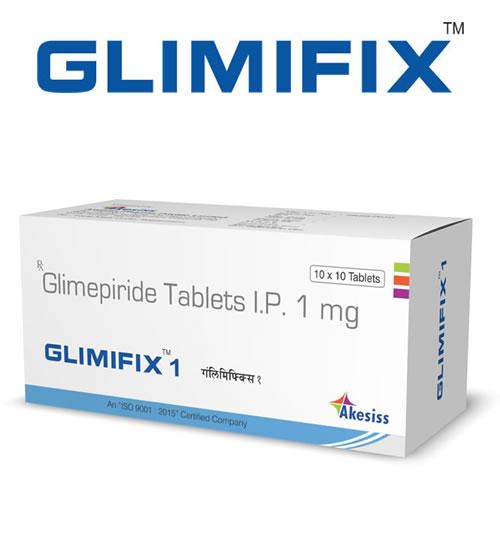COMPOSITION:
GLIMIFIX 1
Each uncoated tablet contains
Glimepiride…….. 1 mg
GLIMIFIX 2
Each uncoated tablet contains
Glimepiride………. 2 mg
INDICATIONS:
GLIMIFIX is indicated as an adjunct to diet and exercise to lower the blood glucose in patients with non-insulin-dependent (Type 2) diabetes mellitus (NIDDM) whose hyperglycaemia cannot be controlled by diet and exercise alone. GLIMIFIX may be used concomitantly with metformin when diet, exercise, and glimepiride or metformin alone do not result in adequate glycaemic control. GLIMIFIX is also indicated for use in combination with insulin to lower blood glucose in patients whose hyperglycaemia cannot be controlled by diet and exercise in conjunction with an oral hypoglycaemic agent. The combined use of glimepiride and insulin may increase the potential for hypoglycaemia.
DOSAGE & ADMINISTRATION:
General
Dosage should be individualized on the basis of both effectiveness and tolerance. There is no fixed dosage regimen for the management of diabetes mellitus with glimepiride or any other hypoglycaemic agent.
Usual Starting Dose
The usual starting dose of GLIMIFIX as initial therapy is 1-2 mg once daily, administered with breakfast or the first main meal. Those patients who may be more sensitive to hypoglycaemic drugs should be started at 1 mg once daily and should be titrated carefully.
No exact dosage relationship exists between glimepiride and the other oral hypoglycaemic agents. The maximum starting dose of GLIMIFIX should be no more than 2 mg.
Failure to follow an appropriate dosage regimen may precipitate hypoglycaemia. Patients who do not adhere to their prescribed dietary and drug regimen are more prone to exhibit unsatisfactory response to therapy.
Usual Maintenance Dose
The usual maintenance dose is 1 to 4 mg once daily. The maximum recommended dose is 8 mg once daily. After reaching a dose of 2 mg, dosage increases should be made in increments of no more than 2 mg at 1-2 week intervals based upon the patient`s blood glucose response. Long-term efficacy should be monitored by measurement of HbA 1c levels, for example, every 3 to 6 months.
Glimepiride + Metformin Combination Therapy
If patients do not respond adequately to the maximal dose of GLIMIFIX monotherapy, the addition of metformin may be considered. Published clinical information exists for the use of other sulphonylureas including glyburide, glipizide, chlorpropamide, and tolbutamide in combination with metformin.
With concomitant glimepiride and metformin therapy, the desired control of blood glucose may be obtained by adjusting the dose of each drug. However, attempts should be made to identify the minimum effective dose of each drug to achieve this goal. With concomitant glimepiride and metformin therapy, the risk of hypoglycaemia associated with glimepiride therapy continues and may be increased. Appropriate precautions should be taken.
Glimepiride-InsulinCombination Therapy
Combination therapy with glimepiride and insulin may also be used in secondary failure patients. The fasting glucose level for instituting combination therapy is in the range of >150 mg/dL in plasma or serum depending on the patient. The recommended glimepirde dose is 8 mg once daily administered with the first main meal. After starting with low-dose insulin, upward adjustments of insulin can be done approximately weekly as guided by frequent measurements of fasting blood glucose. Once stable, combination-therapy patients should monitor their capillary blood glucose on an ongoing basis, preferably daily. Periodic adjustments of insulin may also be necessary during maintenance as guided by glucose and HbA 1c levels.
CONTRAINDICATIONS:
Glimepiride is contraindicated in patients with
1.Known hypersensitivity to the drug.
2. Diabetic ketoacidosis, with or without coma. This condition should be treated with insulin.
PREGNANCY CATEGORY: C


